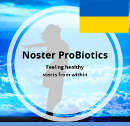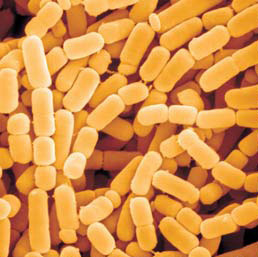Lactobacillus paracasei abbreviated as L. paracasei is a gram-positive, facultatively heterofermentative. It is found in many human intestinal tract and mouth as well as many dairy products. It is a rod-shaped (bacillus shape) bacterium with a width of 2.0 to 4.0μm and length of 0.8 to 1.0μm
From Wikipedia, the free encyclopedia
| Lactobacillus paracasei | |
|---|---|
 |
|
| Lactobacillus bulgaricus, morphologically identical to Lactobacillus paracasei | |
| Scientific classification | |
| Domain: | Bacteria |
| Phylum: | Firmicutes |
| Class: | Bacilli |
| Order: | Lactobacillales |
| Family: | Lactobacillaceae |
| Genus: | Lactobacillus |
| Species: | L. paracasei |
| Subspecies: | Lactobacillus paracasei ssp. paracasei Lactobacillus paracasei ssp. tolerans |
| Binomial name | |
| Lactobacillus paracasei Collins, Phillips & Zanoni, 1989 |
|
Description of the Lactobacillus paracasei
This probiotic has good survivability in stomach acid following oral ingestion. This is important as some strains of probiotic bacteria can be heavily broken down when they reach the acids in the stomach. After passing into the intestines, this probiotic bacteria can confer its beneficial effects.
Lactobacillus paracasei has an 80-90% survival in hydrochloric acid and pepsin at pH 3 for 1h at 37ºC. The Bile salt (small intestines) tolerance resistance is less than 60% survival and the Pancreatin survival rate is more than 60%.
Health Benefits of Lactobacillus paracasei in Brief
They reduce the symptoms of lactose intolerance, as well as increase the bioavailability (the amount available to the body for absorption) of nutrients. They possess hypocholesterolemic (reduce cholesterol), antimutagenic (prevent mutations) and anticarcinogenic (anticancer) properties.
They out-compete intestinal and foodborne pathogens (disease-causing bacteria). They reduce allergies in susceptible people and boost the immune system. The way they work is to first colonise the digestive tract, then induce a mucosal immune response, balance the T-helper cell response and limit the inflammatory response.
Another benefit is the positive effect on blood pressure and blood cholesterol. In women, it has anti-osteoporosis effects as well as the prevention of fat tissue development (a popular effect with women). For those with heartburn and the possibility of ulcers, it prevents the development of mucosal lesions (ulcers).
Lactobacillus paracasei is used in uncomplicated diverticulitis as well as ulcerative colitis by reducing colonic mucosa inflammation.
Irritable Bowel Syndrome patients have a high incidence of Clostridiales Genus Blautia, Anaerostipes and Clostridium. These are reduced by the introduction of L. paracasei. While the levels of Proteobacteria and the Clostridiales Genus Coprococcus, which are low in autistic children and HIV patients, are increased.
Therapeutic uses of Lactobacillus paracasei
Gastrointestinal Tract
Colon
Prevent and repair colon damage due to colitis, the inflammation of the inner lining of the colon. The causes of colitis are
- infection
- inflammatory bowel disease (Crohn’s disease, ulcerative colitis)
- ischemic colitis
- allergic reactions
- microscopic colitis.
The symptoms include
- abdominal pain,
- cramping,
- diarrhoea, with or without blood in the stool (one of the hallmark symptoms of colitis).
Lactobacillus paracasei adheres to intestinal epithelial cell line, the lining of the intestines, and has an antimicrobial action as well.
Immune System
Boosts the immune system with its anti-inflammatory effects, and it has a chemoprophylactic (chemical prevention of disease) effect. This means it releases chemicals which prevent the growth of other bacteria, similar to the effect of antibiotics.
Lactobacillus paracasei prevent disease or infection by supporting the immune system functions by inhibiting the spread of pathogenic (bad) bacteria. Lactobacillus paracasei inhibits the enteric pathogens, disease-causing bacteria of the gut, Salmonella typhimurium, Staphylococcus aureus, Escherichia coli (E. Coli) and Listeria monocytogenes. These bacteria cause infections and foodborne diseases.
L. paracasei also adheres to the human epithelial intestinal wall thereby preventing enteric pathogens access to colonize the intestine.
Respiratory Infections
Is used to reduce the symptoms of respiratory infections.
Fatigue
Increases energy levels thereby improving fatigue. This is probably due to its ability to make nutrients available to the body for absorption.
Dental Health
Lactobacillus paracasei fights the growth of pathogens, disease-producing bacteria, in the mouth.
Weight Loss
Researchers in Sweden showed the group on probiotics had a significantly lower total body fat and they found four times more FIAF hormone (Fasting Induced Adipose Factor) in the blood of the group on the probiotic.
FIAF inhibits the enzyme LPL (Lipoprotein lipase) which fat cells use to absorb fatty acids in the blood. To achieve weight loss results live cultures are essential.
Lowering cholesterol.
There are two types of cholesterol, the so-called good and bad cholesterol. The good cholesterol is VLDL triglycerides (Very low-density lipoprotein). Taking Lactobacillus paracasei will increase the VLDL levels but not change the overall cholesterol levels.
Vaginal infections
A study published in Frontier of Microbiology (September 2015), described the use of Lactobacillus paracasei pessaries to treat Bacterial vaginosis (BV).
Food allergies
<
p style=”text-align: justify;”>Studies showed the efficacy of L. paracasei in treating food allergies.

